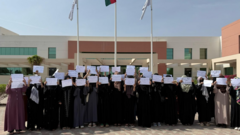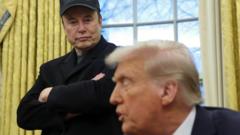In a surprising move, the U.S. government has removed multimillion-dollar bounties on three high-ranking Taliban officials, a step that marks a significant shift in policy by the Trump administration. This decision comes on the heels of a visit to Kabul by U.S. hostage envoy Adam Boehler, the first by a senior American diplomat since the Taliban's takeover in 2021. Boehler's discussions with Taliban representatives resulted in the release of an American citizen who had been imprisoned for over two years.
U.S. Removes Bounties on Taliban Leaders, Signaling Policy Shift

U.S. Removes Bounties on Taliban Leaders, Signaling Policy Shift
The Trump administration's new stance is perceived as a strategic shift towards the Taliban's leadership.
This development has been interpreted as a major triumph for the Taliban, which faced isolation under the Biden administration. Following this diplomatic engagement, the lifting of the bounties appears to bolster more moderate factions within the Taliban, navigating an internal struggle for influence and legitimacy.
Previously, the U.S. had offered up to $20 million in rewards for information about key leaders of the Haqqani network—reputedly the deadliest faction of the Taliban during the two-decade conflict. The names of the three men impacted include Sirajuddin Haqqani, the current acting interior minister of the Taliban, along with his brother Abdul Azizi Haqqani and cousin Yahya Haqqani. Their profiles have now been removed from the State Department's Rewards for Justice initiative, and the FBI's wanted poster for Sirajuddin Haqqani has also been taken down.
The implications of this policy change remain to be seen, but it undoubtedly opens a new chapter in U.S.-Taliban relations and could influence the dynamics of governance in Afghanistan. As negotiations continue, the international community will be watching closely for further signs of moderation from the Taliban leadership.
Previously, the U.S. had offered up to $20 million in rewards for information about key leaders of the Haqqani network—reputedly the deadliest faction of the Taliban during the two-decade conflict. The names of the three men impacted include Sirajuddin Haqqani, the current acting interior minister of the Taliban, along with his brother Abdul Azizi Haqqani and cousin Yahya Haqqani. Their profiles have now been removed from the State Department's Rewards for Justice initiative, and the FBI's wanted poster for Sirajuddin Haqqani has also been taken down.
The implications of this policy change remain to be seen, but it undoubtedly opens a new chapter in U.S.-Taliban relations and could influence the dynamics of governance in Afghanistan. As negotiations continue, the international community will be watching closely for further signs of moderation from the Taliban leadership.






















